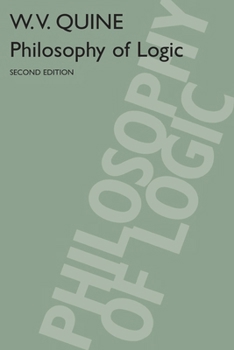Philosophy of Logic: Second Edition
Select Format
Select Condition 
Book Overview
With his customary incisiveness, W. V. Quine presents logic as the product of two factors, truth and grammar--but argues against the doctrine that the logical truths are true because of grammar or language. Rather, in presenting a general theory of grammar and discussing the boundaries and possible extensions of logic, Quine argues that logic is not a mere matter of words.
Format:Paperback
Language:English
ISBN:0674665635
ISBN13:9780674665637
Release Date:June 1986
Publisher:Harvard University Press
Length:128 Pages
Weight:0.45 lbs.
Dimensions:0.4" x 5.9" x 8.9"
Customer Reviews
2 ratings
Philosophy of Logic
Published by Thriftbooks.com User , 16 years ago
For anyone wanting to learn more about how the mechinary of modern logical system works and functions, Quine's "Philosophy of Logic" is a perfect text. While at times the wording can be extremely technical, this text reveals many important keys to understanding modern logic. In addition, if anyone wants a better understanding of Alfred Tarski's philosophical project with Convention T (especially for those wanting to or are studying Donald Davidson), this is a great explanatory text and provides the necessary insights needed to understand Tarski's truth definitions. I would highly recommend this book.
Good intro to some of Quine's philosophy
Published by Thriftbooks.com User , 21 years ago
This is indeed easier and better organized than Quine's other books. I think it better written than "Methods of Logic." Much of "Philosophy of Logic" is about the sort of ideas that should be included in university logic texts, but aren't (the first part of Church's 1956 text is an exception to this sweeping assessment, surprising because written by a mathematician). POL Is also a nice introduction to a range of issues in analytical philosophy. It is the unusual lay person who would find this a profitable read. I say this even though I find the philosophical basis of logic and mathematics deeply fascinating, but it is a fascination I can share with almost no one face to face, and I teach college! While this is a fine introduction to Quine, the lectures he gave in Spain at 84 years of age, "From Stimulus to Science," may be better. I won't deny the weirdness of some of Quine's views. But Quine is less willfully eccentric than many other academic philosphers. Part of the weirdness is that Quine is the closest thing there is to a home grown American member of the Vienna Circle. Quine also shared the instinctive conservatism of the small town midwest he hailed from (Akron OH). This conservatism extended to his views on logic: eg his disdain for modal logic (and for all intensional notions as well), and his dismissal of higher order logic as set theory in disguise. Quine also remained pre-Godelian in many ways. His Mathematical Logic is a sort of last hurrah for Principia Mathematica. He never appreciated the rise of recursive methods or of model theory (even though he admired Tarski). While quite friendly with Carnap, he never understood Carnap's semantical approach. His 3 logic texts are not a good place to learn metatheory: consistency, completeness, decidability, categoricity, independence. Quine took little interest in logic before Frege. In his indifference to the history of ideas, he was typical of analytical types. He was 87 when he finally published a short essay recognizing the achievements of C S Peirce in the 19th century. Among British philosophers of his generation, he admired a fine fellow: Peter Geach. Quine co-discovered virtual sets and relations, but ignored mereology. He revered science and math, but it is unclear how much of it he really knew. Privately, he believed that philosophy should limit itself to logic, epistemology, philosophy of science, and the chaste metaphysics he himself practiced. Quine was not a hopeless conservative. Around 1950, he jumped on the natural deduction bandwagon, and walked away from axiomatics. Later, he walked away from natural deduction, but never cottoned on to truth trees. He was intrigued by Haskell Curry's combinatory logic, and invented a modest rival, calling it predicate functor logic. Quine's set theory, underappreciated in mathematical circles, is downright radical. Finally, Quine's approach to Godel's Theorem, while turgid, contained the seeds of the much more elegant later approach o






